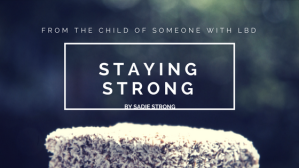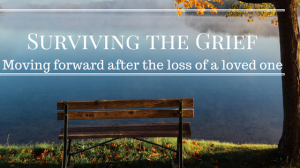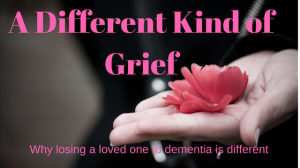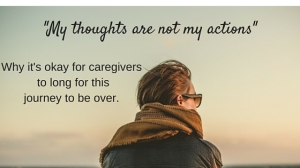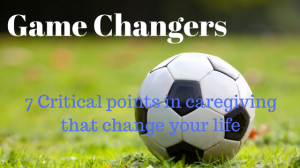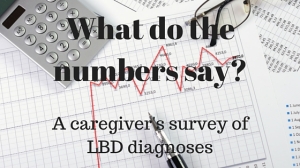Caregiving is hard.
Not just the physical aspects of lifting, bathing, and dressing our loved ones, but there is an emotional component often exacerbated by exhaustion that can be overwhelming at times. I lived through those issues as I provided one-on-one care for my husband for years and eventually shifted to his care advocate once he was placed in assisted care. I thought I understood how my life had changed during our Lewy Body experience, but in the months after his passing, I discovered something else that had happened along the journey, something I wasn’t aware of at the time.
While caring for my husband, I disappeared.
Not literally of course, but during my years as a warrior, I ceased to exist. It didn’t happen overnight. From the time we realized something was wrong until he actually died took around 9 years. The first couple of years, my life didn’t change much. I was worried about him, but I was still able to pursue my writing career, attend conferences, and do book signings. I exercised and sang in the church choir. Like any normal person, I had activities and hobbies that I enjoyed, but as the years progressed, those activities phased out in tiny increments.
It started with my writing career. I quit sending my agent manuscripts because I knew I would no longer be able to meet contractual requirements of a publishing house. Editors get quite testy if you don’t meet your deadlines, but writing while Lewy was in the house was becoming more and more difficult. “It’s okay,” I told myself. “I’ll just indie publish.” And I did…for a while. However, the stress of dealing with Lewy took my productivity from 3-4 books a year down to 1 (if I was lucky.)
I had to stop attending conferences and doing speaking engagements because my husband’s paranoia made it impossible for me to leave home. I started taking him with me until he got lost in the hotels while I was in meetings and I knew that wasn’t going to work anymore.
The writer disappeared.
The next thing sacrificed to Lewy’s hold was my physical health. I’d always exercised and kept fit, but once my husband could no longer be left alone, I couldn’t even leave him alone long enough to walk a mile in the mornings. The pounds crept up and my fitness level tanked. His needs were becoming more intense and my back paid the price for lifting and showering him, etc. Physically, I fell apart, but looking back on it, I realize I didn’t really care anymore at that point. My physical needs weren’t important compared to his.
The healthy active woman disappeared.
Next was the lack of sleep. Many caregivers reading this now are nodding in agreement. Having a LO with dementia is like having an infant. The disease changes their sleep patterns and it’s not unusual for them to get up 4 or more times per night. Remember those months of sleepless nights when your newborn awoke every few hours? Now, imagine that going on for years and you can understand some of what a caregiver goes through once their loved one can no longer function without supervision at night. The exhaustion is deep and it affects everything you do. All thoughts, feelings, decisions are tainted by an overwhelming mental numbness. At this point, many caregivers begin having concerns they too are developing dementia. They aren’t, of course, but the confusion caused by fatigue and stress can make them feel like that for a while. I lived in a perpetual state of exhaustion.
The creative woman disappeared.
It wasn’t long until most of the things I enjoyed slipped off the grid. I couldn’t leave him alone to attend church or sing in the choir, and he was no longer able to go with me. For the same reasons, I could no longer attend parties, weddings, or even have lunch with friends. There were no trips to the mall or walks around the park. No vacations, dinners out, or going to the movies. I couldn’t even read because concentrating on a book became impossible.
The adventurous, socially active woman disappeared.
Losing the ability to leave him alone enough to meet up with friends led to fewer and fewer invites and eventually, the friends drifted away. I don’t blame them for that. I constantly had to refuse the invitations so why would they continue to ask? Little by little, I lost contact with almost everyone except immediate family. Many people don’t know how to deal with someone who has dementia. They don’t know if they should call or visit, so they don’t do either. When I would get upset over the lack of outreach, I would remind myself that I’d never visited others in a caregiving situation either. I didn’t want to add to their stressful days. Little did I know how much they would have loved having someone to talk to.
Writing, reading, exercising, singing, friendships, travel…most of the things that defined me as a person, disappeared over the years we fought Lewy Body Dementia.
None of my attention or efforts were focused on my needs because the needs of my LO were more serious. Though through it all, I don’t regret one moment of that devotion. He was half of me and I loved him to the very end, but I can now see that I neglected myself more than I probably should have.
Once my husband was placed in assisted care, I started the journey to regain myself as much as possible. I texted a friend and asked if she’d like to meet for lunch. Much to my surprise, she thanked me and said, “I’d love to! I’m so glad you reached out to me. I didn’t know what to do.” That was when I realized that I couldn’t assume others knew what I was going through. How could they if I didn’t tell them? If I wanted to see someone, I needed to initiate the contact.
I began exercising (and sleeping) again. I still spent the days with him, but mornings and evenings were mine and I used them to regain as much of me as I could. Twenty months after he entered assisted care, he died at the age of 63 and just one month shy of 5 years after being diagnosed with Lewy. At the time of this post, it’s been 4 ½ years since he passed, and I’m back on my feet once more. I’ve rekindled old friendships and developed new ones. Physically, I feel better than I have in over a decade. It took a couple of years, but I decided to focus on my recovery with as much vigor as I’d tackled my husband’s caregiving. Life is good once again.
For those still in the trenches, feeling as though you have disappeared, take some comfort in knowing your feelings are not unique nor are they permanent. Try to carve out time for yourself whenever you can and never feel guilty for doing so. Work as hard for your personal care as you do for your loved one. While their needs may occasionally be more immediate, they are not more significant than yours. There were times when I would actually look in the mirror and say, “My life is important too.” Caregivers often forget that.
Don’t let Lewy take two victims.
Blessings to all caregivers. You earn your wings every day.
*Feel free to share this post if you feel it might help others gain a better understanding of the caregiving journey.
*If you’d like to follow this blog (it’s free) click on the follow button on the right side of this page and you’ll receive an email whenever there’s a new post. You can unfollow any time you wish.
*If you’d like to see past posts, go to the top of this page and click the “home” button and scroll down, or go to the “categories” on the right side of the page. There are also buttons at the top for helpful links, and other information.
*I’m also a published fiction author. If you want to check out my books, you can find out more about them here.

